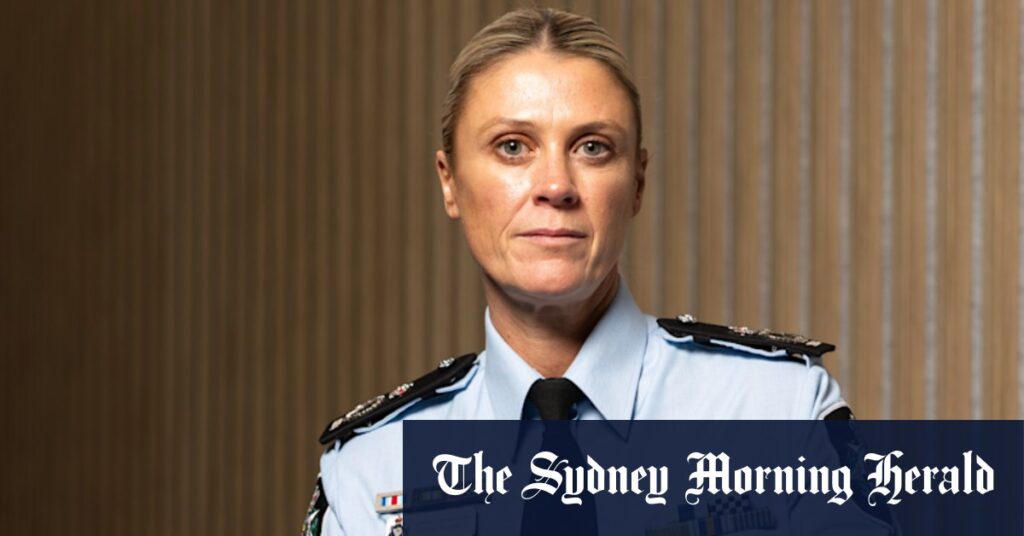
Australia’s newly appointed federal police chief, Krissy Barrett, has issued a stern warning to extremists inciting fear and violence at protests, marking them as prime targets in her comprehensive overhaul of the national police force. This initiative aims to safeguard democracy from the turmoil generated by radical actors and rogue states, such as Iran.
The announcement comes as Barrett navigates her first week as the Australian Federal Police’s (AFP) top officer. The timing coincides with the anniversary of the October 7 attacks by Hamas, which, alongside Israel’s response—termed a genocide by the United Nations—has led to a significant increase in ideologically driven cases.
“We are putting these groups on notice,” Barrett stated in an interview at the AFP’s Canberra headquarters. “The way some of these groups are physically presenting at protests is causing fear. You’re on our radar … and we will be using all of our capabilities, partnerships, and technological capabilities to protect the social cohesion of this country.”
Shifting Focus: From Enforcement to Security
Barrett, who succeeded Reece Kershaw as Australia’s top cop on Monday, is steering the agency away from merely enforcing federal laws. Instead, the focus is shifting towards confronting threats fueled by far-right conspiracy theories, online radicalization of youth, and foreign states exploiting encrypted apps and criminals to incite antisemitism and social unrest.
Her first major initiative involves launching national security investigation squads. These teams will collaborate with Five Eyes partners and state police to monitor Nazi groups and other radicals, including those influenced by the ongoing conflict in Gaza. While these groups are not yet engaging in terrorist activities, they are potentially violating new hate crime laws, providing the AFP with a fresh set of targets.
Protecting National Landmarks and Politicians
Barrett highlighted the increased focus on safeguarding Canberra’s national landmarks from vandalism and addressing the growing number of threats against politicians. Recently, a Queensland man faced charges for threatening to kill Prime Minister Anthony Albanese on social media.
“These threats are real,” Albanese remarked on Monday. “We have seen in other countries, in the United States, in the United Kingdom, public figures, whether they be politicians or other public figures, targeted.”
Barrett also noted a troubling rise in local activists damaging property and targeting businesses based on the owners’ religion. “More and more since October 7, we are seeing what’s happening to social cohesion in Australia and the emerging prevalence of what we describe as hate crimes,” she said. “It’s fear, it’s hatred, it’s humiliation.”
Integrating Intelligence and Law Enforcement
Previously the deputy commissioner overseeing national security, Barrett has unveiled a new mission statement, further aligning the AFP with the intelligence community. In her address to staff, she emphasized the need to “defend and protect Australia and Australia’s future from domestic and global security threats.” This shift moves the AFP’s emphasis from drugs and terrorism to emerging threats to Australian sovereignty and democracy.
State governments have historically been hesitant to enforce laws against violent rhetoric and hate speech. However, the AFP will now play a coordinating role to ensure these laws are effectively prosecuted. The force is already investigating graffiti in Melbourne that glorifies Hamas, coinciding with legal challenges against planned anniversary protests in Sydney.
Blurring Lines: Crime and Terrorism
Both Barrett and her ASIO counterpart, Mike Burgess, have spoken about the challenges of policing the increasingly blurred lines between criminal activity and terrorism. This issue was highlighted by the summer outbreak of antisemitic crimes, reportedly funded by Iran.
In August, it was reported that Melbourne tobacco wars kingpin Kazem Hamad was suspected of collaborating with the Iranians. Barrett referenced Hamad’s alleged involvement in a synagogue attack, stating that the AFP would refocus its efforts on illicit tobacco policing to prevent profits from funding social unrest.
“The change in the geopolitical and criminal environment requires the AFP to pivot to a different posture,” Barrett said. “We are in a region facing intense strategic competition, and we are witnessing nation states that are much more willing to test the resolve of democracies. States are using criminal proxies to destabilize adversaries.”
Cybersecurity and International Collaboration
Barrett also highlighted the growing threat of cyber warfare, with China identified as Australia’s main rival. Last year, Foreign Minister Penny Wong and her counterparts from Japan, the US, and India expedited cybersecurity measures across the Pacific to counter China, although Wong refrained from naming the superpower directly when unveiling these new defenses.
Opposition acting home affairs spokesman James Paterson criticized the Albanese government for its delayed response in empowering the AFP to address this increasingly perilous environment. “It should not have taken two years since the atrocities of 7 October and the horrific antisemitism it unleashed in Australia for the government to finally institutionalize their response to this crisis,” he stated.
As Barrett takes the helm, her initiatives represent a significant shift in Australia’s approach to national security, focusing on emerging threats and the protection of democratic values.






